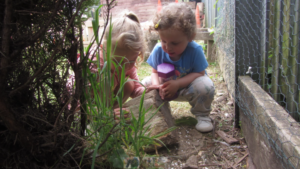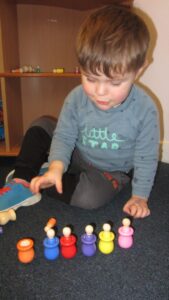Our Pre schoolers like their younger peers learn from the people around them and how they are attended to, the environment that they are in and the opportunities it provides. At minihome the key worker continues to be a crucial part of each child’s learning environment. The key groups are larger, but both children and adults appreciate the relationship that key workers offer. By providing a warm, loving relationship they are a secure base from which the child continues to explore with confidence. They continue to ensure that they gather information from you on your child’s needs, likes and dislikes, developmental stage and interests. We make sure that there is regular dialogue about each child’s changing needs between the key worker and the family.

Key workers support Pre-Schoolers to manage independently in their peer group using their communication skills in social situations to keep the play flowing with their friends, cooperate around problem solving and have fun together. Like the 2 year olds some Pre-Schoolers explore the effects that they can have on those around them and so the adults help them to negotiate these emotional times. We continue to talk about feelings, what makes us sad or happy or angry and to try to think how our actions can make others feel.
We support these older children to speak about their interests and to think about how these could be developed at nursery with us. This might be through reading and researching together, making things or carrying out science experiments, or going to look at things in the real world. In this way, we try to see if we can firstly develop plans from children’s interests. If a child is interested in dinosaurs this might be supported by reading up about dinosaur facts, role play with dinosaurs to support imagination and creativity, making environments or props together for dinosaur play. Using writing skills / mark making to record what we see or learn. Making dinosaur foot prints or exploring fossils. Along the way we might talk about relative size of dinosaurs, measuring and counting them and learn about their habitats, food preferences and skeletons.

Play is the Way – Our children learn through playful experiences that help them to develop and learn life long skills. Play is an intrinsic part of human nature and development. For babies and children, the essential role of play is well documented. Through play a child develops their cognitive, social, emotional and physical capacities.

We know how important it is for children to be given time to play throughout the day to follow their own line of enquiry or individual interest. Play is often thought of as children’s work (Isaacs, 1930) and anyone observing children absorbed in play can see how hard they work.
But play is not simple.
Play can be and mean many different things to children and adults. We may describe activities we plan as ‘play’ whereas a child may not see these as play at all. ‘Play’ is therefore both a tricky word and concept to describe. It can be fun and joyful or difficult and complicated. This is a challenge for us as the act can be misinterpreted as being ‘just play’. The intrinsic value of what a child is actually doing and learning can be missed or ignored and therefore seen as less valuable. We also may consciously or unconsciously place more value on tasks we plan and lead with pre-determined outcomes.

“A partnership between children and adults where children can negotiate input and outcomes serves to increase their autonomy and sense of purpose – potentiating and motivating” (Fisher, 2013)
“Through embracing a negotiated learning environment, through hearing and responding to children’s voices in the design of the environment, an Early Level environment can become a “potentiating” area.” – Claxton and Carr, 2004
‘An effective environment sets the optimum conditions for learning and development’.
Reggio Emilia
Alongside the children’s own areas of interest we look to stimulate their interest in the world outside, with daily walks in our local park and community, looking at the roles of people in our community, the local library, shops, post office, travel agents, bank, Fire, Police station, Opticians and Doctor’s Surgery. We look at maps and make maps.

Children’s mark making and early writing is encouraged in all areas of the curriculum and children start to sound out letters using phonics as a way to segment words to be able to spell them and blend them to be able to read them. We move at the child’s pace spreading out from the personally significant letters and sounds to more systematic filling in of the gaps. We encourage the children’s in reading and writing to flow from their interest in adults reading and writing, the words within the environment and the link between familiar stories in picture books with the accompanying words to unpick together. We use small group games and activities to support this.
Maths is also woven through the curriculum with opportunities to extend mathematical understanding, start to connect numerals with quantities and some children will begin to write them.
A creative workshop is supplied with objects to use in junk modelling, making pictures with; crayons, pencils, chalk and paint, plus glue and interesting bits and bobs for sticking. Children are supported to learn how to use scissors and how to stay safe with these. We also introduce sewing and finer beads and threading to this group. The fine motor and construction sets become more complex requiring greater control, strength and accuracy, gears, small Lego and small puzzle pieces for example.
Science is explored in adult led focus activities and has included making exploding volcanoes and other mixture experiments, exploring light, sound, friction, pulleys, what plants need to grow, life cycles of butterflies, frogs and plants.

There is time outside every day in our garden, which children can access freely. Pre School children enjoy using the tricycles and scooters, they start to play ball games, kicking, throwing and catching, small circle games, chasing and catching. They often take their role play with their peers outside, organising increasingly complex scenarios, frequently Super heroes, Pirates, Police, or Princesses and Princes. They take turns and need very little adult support in organising the flow of play and negotiating the roles.
We also draw attention to the features of the natural world, grow plants together and investigate the mini-beasts and animals that we come across. We provide, sand, water, mud play and other types of sensory play. There are large blocks to build with, platforms to climb on and develop gross motor skills.

Pre School children, like all children at Ballerup are observed by their key worker and others to plan and provide for their developmental needs. We also assess their development to ensure that any developmental issues are picked up on and appropriate action taken to support you and your child to access additional help if needed.

